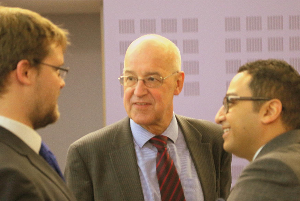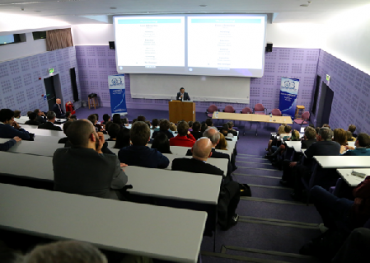
Mina Bekheet and Oxford Biotech
Mina Bekheet is a 2nd-year DPhil (PhD) student in the Department of Oncology and co-founder and President of Oxford Biotech (OB), a student-led biotech communication and transfer platform. OB aims to get academia, industry and government to talk to each other and share ideas and, in turn, 'translate innovative science into disruptive business'. Find out how a small group of multinational young DPhil students have managed to establish a growing and well-connected enterprise, and how they ditch their lab coats at the end of the day to replace them with business suits and evenings spent networking with students, academics, senior managers and CEOs of big pharma, Biotech, SMEs, IP and investment firms, and government officials!
This piece originally appeared in the May issue of OxfordMedSci News, the Medical Sciences newsletter.
What’s behind Oxford Biotech?
'Strong research universities, like Oxford, are full of skilled students and staff, so there’s a lot of latent potential here. We want to work with these people, show them how to get started in business and provide support for new biotech companies.
'We are currently preparing to run large-scale competitions and intakes, where, in the future, top-notch ideas enter our Innovation Centres. Our plan is to partner with winning teams and provide them with free lab and office space and mentoring from industry, research and venture capital professionals. The plan involves operating four seed funds for start-ups: Small Molecules; Rare Diseases & Orphan Drugs; Diagnostics & Novel Health Technologies and Genomics & Digital Health.
'We are also establishing ourselves as a biotech communication platform by running events and teaching bio-entrepreneurship with high-profile university and industry professionals, and placing PhD students and postdocs in industry consulting projects. These activities aim to bridge the gap between academia, industry and government.
'One of the standout features of OB is that postgraduate students are leading all of its divisions: Networking, Editorial, Education and Consulting, as well as Business Development and associated investment.'
Where did the idea for Oxford Biotech come from? Did you sense a gap in the market?
 'There are definitely gaps at different levels, whether from a translational perspective wherein only a few ideas are taken from the lab into the clinic; from an economical perspective where limited funding and support is available for early-stage start-ups; and from a cultural and organisational perspective, where there’s increasing pressure on students to publish, leaving them with limited space to explore potential commercial use of their ideas.
'There are definitely gaps at different levels, whether from a translational perspective wherein only a few ideas are taken from the lab into the clinic; from an economical perspective where limited funding and support is available for early-stage start-ups; and from a cultural and organisational perspective, where there’s increasing pressure on students to publish, leaving them with limited space to explore potential commercial use of their ideas.
'Europe’s infrastructure to support the student entrepreneurs is still fragmented, which simply leads students to act on their own. While this may reflect reality in the business world it also means that we lose talent and good ideas if students don’t have the support they need.
'A recent study by a faculty in the USA estimated that all active companies worldwide formed by the faculty’s graduates exceeded $2 trillion a year – which is more than the GDP of all but the 10 largest nations. There is definitely an opportunity for us here!'
The OB leadership team and project managers are all students. What’s your thinking behind such a student-led group?
'University-age entrepreneurs are quite adaptable, willing to innovate and be elastic in their approach; they are strong-willed but open-minded and, most importantly, they have the relevant hands-on technical insight as part of their research. It has allowed us to establish a team that tolerates failure, accepts calculated risks and acknowledges mistakes and is willing to learn from them and become stronger.
'Putting the team together has been challenging, as our research places significant demands on our time, which has necessitated a very professional approach to the work from all of us.
'The team have to counter-balance the risk of jumping out of the mainstream and commit to some sleepless nights, whilst also delivering their best academically and for OB. We are trying to build an environment where this extra effort is tempting and rewarding. This culture is not exclusive to our team; we are radiating it upon everyone within our network, and will extend it to those entrepreneurs whom we collaborate with.'
What’s the plan when you all graduate?
 'I like to think about OB as the prequalifying round, where the winners will join the premier league. OB will always be led by students running all the complimentary activities, and those who excel in OB later on will join the more advanced level through "OB ventures" after graduation.'
'I like to think about OB as the prequalifying round, where the winners will join the premier league. OB will always be led by students running all the complimentary activities, and those who excel in OB later on will join the more advanced level through "OB ventures" after graduation.'
You’re also studying for a DPhil right now; how do you manage to juggle OB and your studies? What are the potential benefits to your studies/research from being involved in OB?
'No holidays, less social life, lunch on the move, few hours of rest and sleep, but much more rewarding momentum in life.
'The price of success is hard work, dedication to the job and the determination that, whether we win or lose, we have applied the best of ourselves to the task at hand. I’m convinced that what really makes successful entrepreneurs is pure persistence.
'OB adds a whole new dimension to the understanding of my research, which is focused on personalised cancer therapy. I’m particularly interested in developing a detailed understanding of the key epigenetic pathways that regulate tumour cell death, and thereafter use this knowledge to devise strategies for delivering more effective cancer treatments within an applied clinical setting. I’m always thinking about how each experiment will fit within the route of developing a final clinical product. I also have to say that the connections I make through OB help a lot with my daily lab work.'
Why innovation? What got you interested?
'It’s simply part of investigating this question of how good ideas arise, a problem I think all of us are fundamentally interested in. We want to come up with superior ideas and be more innovative, and we want our environments to be more creative.
'There is no certain single formula for finding the next big thing, but we think our simple two-step approach can help. Firstly, networking, communication and establishing a dialogue where all players talk the same language is really important. These informal situations are where most good ideas form. Secondly, there’s a need to identify and select the most lucrative ideas at their very conception – "the scientific seed of innovation" as some OB team members like to call it. This model of start-up identification is designed to boost commercial output that matches our world-leading science output.'
What does innovation mean to you?
'Humans are innovative by default; we just have different perceptions about innovation. For me, innovation has to be disruptive, a process that brings together various novel ideas in a way that they have an impact on society, creating high value for both stakeholders and end-users. Our ability to promote our quality of life for centuries to come is fundamental concern, innovation is the answer.'
What is your vision behind OB?
'Darwinian innovation within a well-defined position in the ecosystem. Our aim is to start by investigating disciplines through which pioneering new companies can provide extraordinary returns, new technologies that can solve universal problems and renovate global markets in health and life sciences. Sets of opportunities that are intact are created thereafter. We then work together to pinpoint breakthrough technologies in these intersections. The result is high-impact start-ups that are of unprecedented quality.'
What is your biggest success to date and what have you learned from that? What was your biggest mistake and what did you learn from that failure?
'My biggest success was putting OB’s current central team together. I have found that monetary rewards don’t lead to better performance when it involves creative conceptual thinking. It’s more important to provide sovereignty and purpose if you want to create an outstanding team. I am simply lucky to be working with each and every one of them.
'My biggest mistake is that I didn’t start OB earlier. Maybe this was because there was social pressure to follow the traditional path, or maybe because I simply didn’t think that I was ready yet, or maybe I just wasn’t in the right place at the right time with the right people.
'So my advice: try or you’ll regret it. Start as soon as you have an idea, and even if it doesn’t work out, you will have learnt something. The critical element is standing up and doing something. It’s as simple as that. A lot of people have ideas, but there are few who decide to do something about them now. Not tomorrow, not today, but now. The true entrepreneur is a doer, not a dreamer.
'In real life, no-one has a hassle-free path to success. Failure is part of that path. And those who fail the most seem to experience the most simply because they attempted the most. If we are not failing, we are not trying.'
What has surprised you the most since you have started OB?
'People have been very generous in giving us advice, sparing so much effort and time and expecting nothing in return, but really believing in what we are doing. Personally, I’ve been incredibly fortunate to have received advice and counsel from people considered the best in their field. Hats off also to the University, the Medical Science Division, the Mathematical Physical and Life Sciences Division, the Saïd Business School, Oxford University Innovation, academics, administrators, business development teams and industry professionals – so many that I cannot name each.'
Where do you see OB in the future?
 OB Conference
OB Conference'Translating innovative science into disruptive business. Thinking really big and reshaping the ecosystem and industry around us, building the next generation of high-impact start-ups and a novel generation of bio-entrepreneurs.'
What are OB’s near-future activities?
'Quite a lot, actually. To name a few, we have started operating new divisions in London, Cambridge, Nottingham and Edinburgh this week, expanding into Asia and Europe this summer; running our BioStars business plan competition in collaboration with the Structural Genomics Consortium later this year; first intake of start-ups Q2 2016, running OB’s 360° start-up building vehicle in collaboration with the Saïd Business School in parallel. That is in addition to our outstanding regular activities: an Ebola Summit in July, CRISPR conference in August, NGS conference in October, and a consulting workshop in September! And so many other initiatives are still in the pipeline.'
What is your future challenge?
'Entrepreneurs tend to change the way we think about what is conceivable; they have a good concept of how life can be improved for all of us, even when the wave is high. This, I believe, is even more influential upon our lives from the biotech and life science perspective.
'The real challenge remains: what opportunities will we go after, how and why? We know ourselves; we know that the risk is not the actual reward. The rewards are changing people’s lives, creating jobs, driving innovations and making a better world. I love stories, watching innovations from conception until completion. We are here to do this.'
